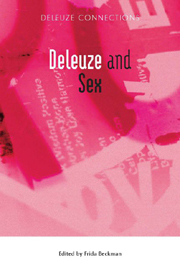Book contents
- Frontmatter
- Contents
- Acknowledgements
- Introduction: What is Sex?: An Introduction to the Sexual Philosophy of Gilles Deleuze
- 1 Alien Sex: Octavia Butler and Deleuze and Guattari's Polysexuality
- 2 Heterotica: The 1000 Tiny Sexes of Anaïs Nin
- 3 Haemosexuality
- 4 Disability, Deleuze and Sex
- 5 Tongue and Trigger: Deleuze's Erotics of the Uncanny
- 6 (Hetero)sexing the Child: Hans, Alice and the Repressive Hypothesis
- 7 The ‘Non-Human Sex’ in Sexuality: ‘What are Your Special Desiring-machines?’
- 8 Deleuze and Selfless Sex: Undoing Kant's Copernican Revolution
- 9 A Preface to Pornotheology: Spinoza, Deleuze and the Sexing of Angels
- 10 Encounters of Ecstasy
- 11 Beyond Sexuality: Of Love, Failure and Revolutions
- Notes on the Contributors
- Index
6 - (Hetero)sexing the Child: Hans, Alice and the Repressive Hypothesis
Published online by Cambridge University Press: 12 September 2012
- Frontmatter
- Contents
- Acknowledgements
- Introduction: What is Sex?: An Introduction to the Sexual Philosophy of Gilles Deleuze
- 1 Alien Sex: Octavia Butler and Deleuze and Guattari's Polysexuality
- 2 Heterotica: The 1000 Tiny Sexes of Anaïs Nin
- 3 Haemosexuality
- 4 Disability, Deleuze and Sex
- 5 Tongue and Trigger: Deleuze's Erotics of the Uncanny
- 6 (Hetero)sexing the Child: Hans, Alice and the Repressive Hypothesis
- 7 The ‘Non-Human Sex’ in Sexuality: ‘What are Your Special Desiring-machines?’
- 8 Deleuze and Selfless Sex: Undoing Kant's Copernican Revolution
- 9 A Preface to Pornotheology: Spinoza, Deleuze and the Sexing of Angels
- 10 Encounters of Ecstasy
- 11 Beyond Sexuality: Of Love, Failure and Revolutions
- Notes on the Contributors
- Index
Summary
Michel Foucault's The History of Sexuality is widely read as a trenchant critique of psychoanalysis and as thus critically and politically linked to Gilles Deleuze's opposition to psychoanalysis, especially in his work with Félix Guattari. This connection is supported by Foucault's well-known preface to Deleuze and Guattari's Anti-Oedipus, in which he praises the text as a corrective to ‘The poor technicians of desire – psychoanalysts and semiologists of every sign and symptom – who would subjugate the multiplicity of desire to the twofold law of structure and lack’ (Foucault 1983: xii–xiii). But the many important connections between Foucault and Deleuze, unfolded more circumspectly in Deleuze's book Foucault, do not mean that they make the same arguments, even with regard to the psychoanalytic model of subjectivity which they both saw as a vital object of concern. This chapter takes Foucault's discussion of psychoanalysis in The History of Sexuality as a starting point for comparing Deleuze's use of children in The Logic of Sense with his Capitalism and Schizophrenia texts with Guattari. We are interested in how Deleuze's generally positive representation of child sexuality – particularly his references to the characters Little Hans (from Freud's case study Phobia in a Five-year-old Boy; Little Hans) and Alice (from the novels by Lewis Carroll) – relates to the critique of psychoanalysis mounted by Deleuze and Guattari.
Freud has a range of sometimes contradictory theories concerning childhood sexuality. But if his work cannot fairly be reduced to a monolithic story of child sexuality, Little Hans is both a touchstone for several of Freud's other papers and foundational to one of his most famous theories, the Oedipus complex.
- Type
- Chapter
- Information
- Deleuze and Sex , pp. 117 - 134Publisher: Edinburgh University PressPrint publication year: 2011

